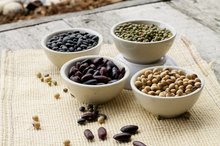What does fact checked mean?
At Healthfully, we strive to deliver objective content that is accurate and up-to-date. Our team periodically reviews articles in order to ensure content quality. The sources cited below consist of evidence from peer-reviewed journals, prominent medical organizations, academic associations, and government data.
The information contained on this site is for informational purposes only, and should not be used as a substitute for the advice of a professional health care provider. Please check with the appropriate physician regarding health questions and concerns. Although we strive to deliver accurate and up-to-date information, no guarantee to that effect is made.
Nutritional Value of Black Raspberries
Black raspberries are a dark berry similar to raspberries and blackberries. They are native to North America and can typically be found fresh in the month of July. You can use black raspberries in similar ways to red raspberries. They are an excellent snack and you can also use them in pie recipes and to top cereal.
Calories
A 100 g serving, or about 2/3 cup, of black raspberries contains 72 calories. The majority of these calories come from carbohydrates of which there are 17 g. One serving of black raspberries also contains 5 g of natural fruit sugar and 1.7 g of fiber, which is about 5 percent of the daily value for adults. Black raspberries are low in both fat and protein, with .1 g and 1.4 g per serving, respectively.
Minerals
Black Raspberry Benefits
Learn More
Black raspberries are higher in iron than many other fruits, with 1.4 mg per serving. This provides 18 percent of the daily value for men and 8 percent for women. Iron is essential for the formation of hemoglobin, which is the oxygen-carrier protein found in red blood cells. A lack of iron can lead to health issues such as fatigue. Black raspberries also contain a small amount of calcium; one serving supplies 3 percent of the daily value.
- Black raspberries are higher in iron than many other fruits, with 1.4 mg per serving.
- Black raspberries also contain a small amount of calcium; one serving supplies 3 percent of the daily value.
Vitamins
Black raspberries contain small amounts of both vitamin A and vitamin C. One serving supplies 3 to 5 percent of the daily value for both of these nutrients. Vitamin C is important for collagen formation and the absorption of iron. Vitamin A promotes proper night vision.
- Black raspberries contain small amounts of both vitamin A and vitamin C. One serving supplies 3 to 5 percent of the daily value for both of these nutrients.
- Vitamin C is important for collagen formation and the absorption of iron.
Ellagic Acid
Nutrition in Organic Black Mission Figs
Learn More
Black raspberries are high in ellagic acid, a plant chemical also found in other dark fruits and some nuts. According to the American Cancer society, ellagic acid was found in some animal studies to slow the growth of some cancerous tumors such as those in the lungs and esophagus 1. This has not been backed up with valid research in humans.
Anthocyanins
The dark blue to black color of black raspberries comes from the presence of pigments called anthocyanins. Anthocyanins provide not only color to black raspberries, but they also provide nutritional benefit, as they are antioxidants. Like other antioxidants, such as vitamin C, anthocyanins can protect your cells against damage from toxins called free radicals. According to The Linus Pauling Institute, anthocyanins may help to improve your vision, fight inflammation and treat ulcers 2. More research is needed in these areas before recommendations on anthocyanin intake can be made.
- The dark blue to black color of black raspberries comes from the presence of pigments called anthocyanins.
- Anthocyanins provide not only color to black raspberries, but they also provide nutritional benefit, as they are antioxidants.
Related Articles
References
- American Cancer Society; Find Support and Treatment: Ellagic Acid; Nov. 1, 2008
- Linus Pauling Institute; The Possible Health Benefits of Anthocyanin Pigments and Polyphenolics; May 2001
- Raspberries, raw. FoodData Central. U.S. Department of Agriculture. Updated April 1, 2019.
- Managing Dietary Carbohydrates for Better Health. School of Medicine and Public Health University of Wisconsin - Madison.
- Burton-freeman BM, Sandhu AK, Edirisinghe I. Red raspberries and their bioactive polyphenols: Cardiometabolic and neuronal health links. Adv Nutr. 2016;7(1):44-65. doi:10.3945/an.115.009639
- Weiskirchen S, Weiskirchen R. Resveratrol: How much wine do you have to drink to stay healthy?. Adv Nutr. 2016;7(4):706-18. doi:10.3945/an.115.011627
- Washington Red Raspberries. North Carolina Cooperative Extension.
- Wang PW, Cheng YC, Hung YC, et al. Red raspberry extract protects the skin against UVB-induced damage with antioxidative and anti-inflammatory properties. Oxid Med Cell Longev. 2019;2019:9529676. doi:10.1155/2019/9529676
- Basu A, Schell J, Scofield RH. Dietary fruits and arthritis. Food Funct. 2018;9(1):70-77. doi:10.1039/c7fo01435j
- Possible Anaphylaxis to Blueberry: Cross-Reactivity With Other Berries. American Academy of Asthma, Allergy, & Immunology. Updated 2018.
- Home Fruit Gardens: Table 7.1. Recommended Raspberry Varieties for Pennsylvania. Penn State Extension. Updated 2016.
- Huyck L. Using, Storing and Preserving Raspberries. Michigan State University Extension. Updated 2012.
Writer Bio
Lisa Thompson has been writing since 2008, when she began writing for the Prevention website. She is a holistic health practitioner, nationally certified massage therapist and National Council on Strength and Fitness-certified personal trainer. Thompson also holds certificates in nutrition and herbology from the Natural Healing Institute, as well as a Master of Education from California State University.









